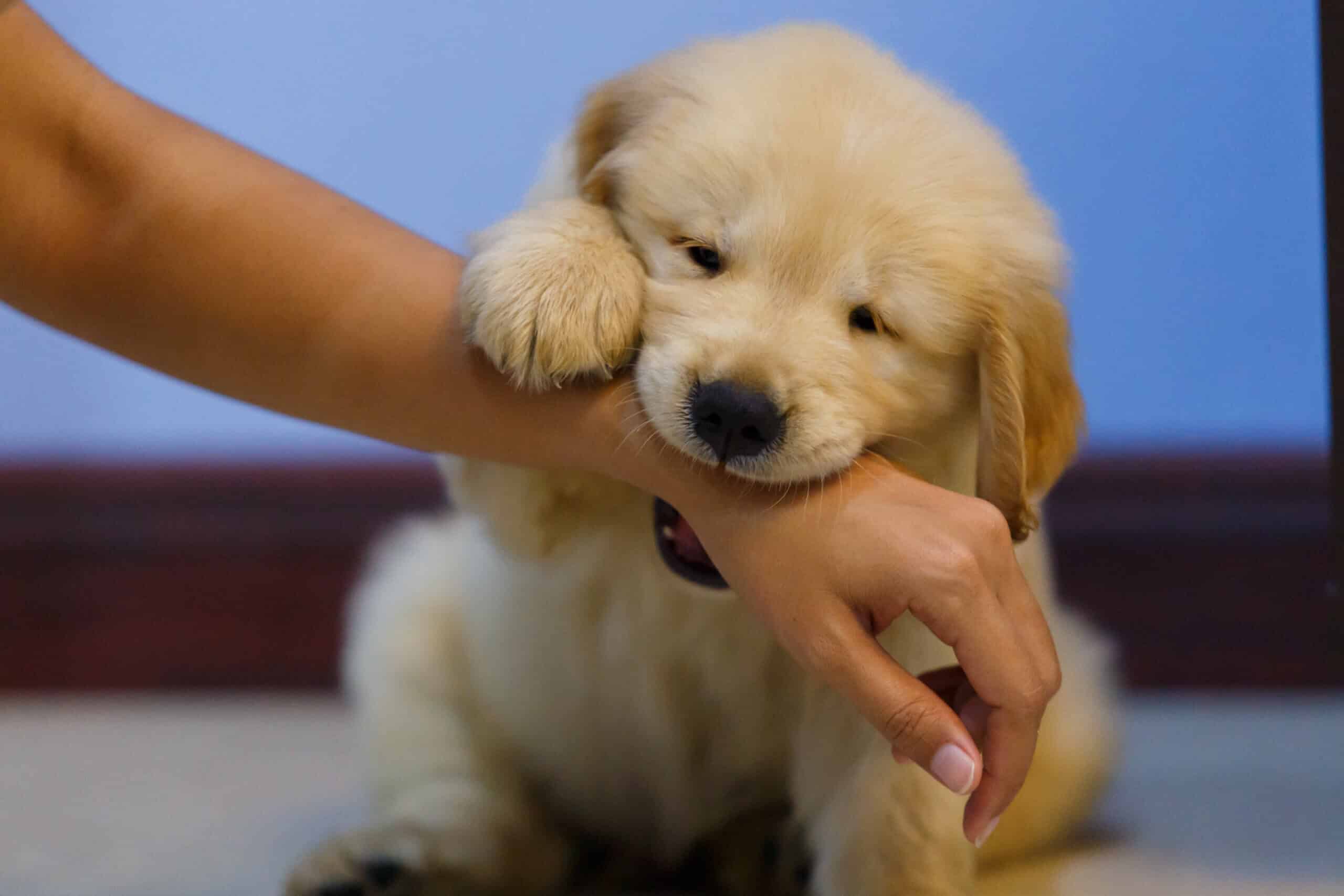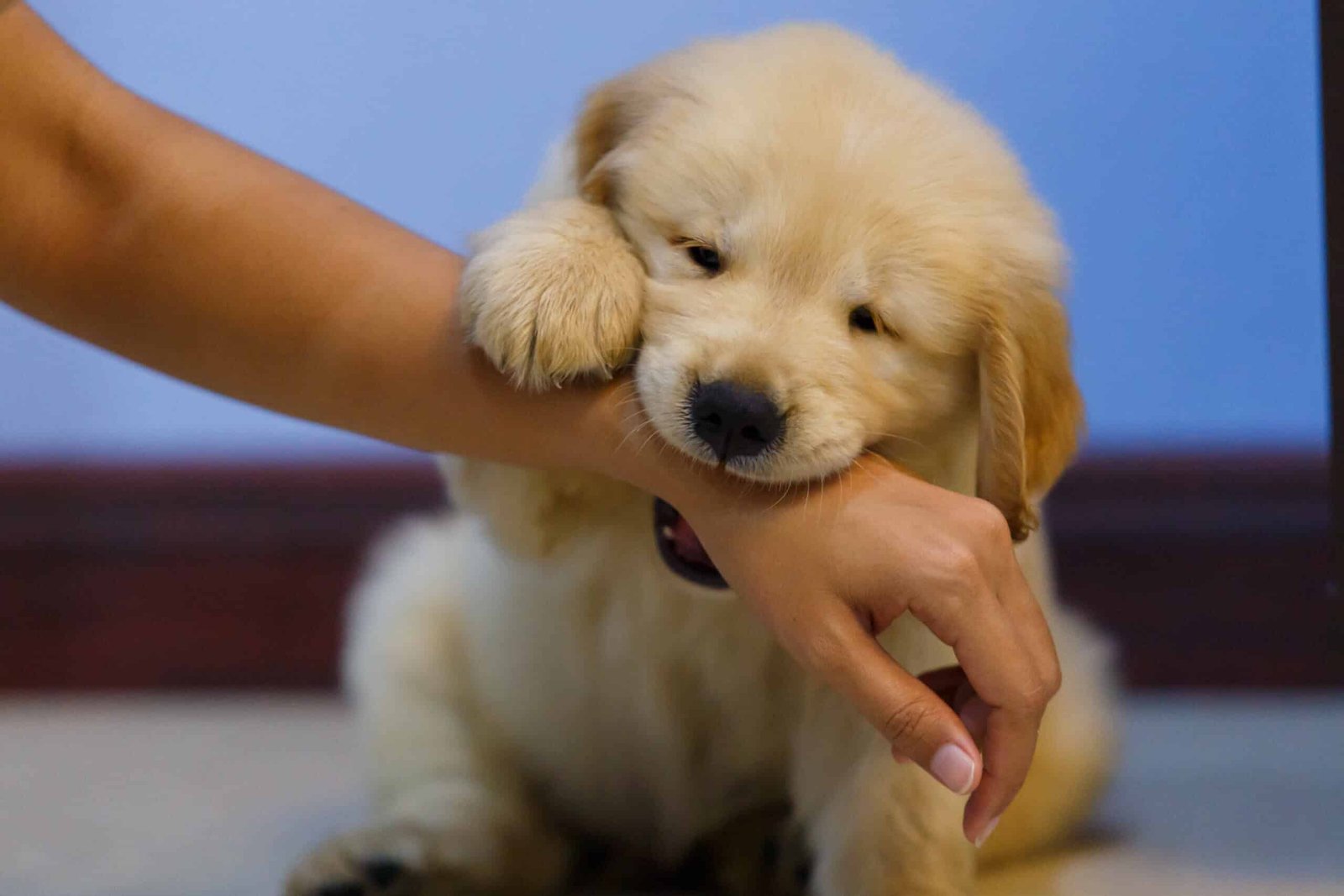If you’ve ever been around a golden retriever puppy, you might have noticed their adorable habit of chewing on just about anything they can get their paws on. But do golden retriever puppies really chew a lot? The answer is a resounding yes! These playful furballs are notorious for their love of chewing, and it’s totally normal behavior for them. So, in this article, we’ll dive into the world of golden retriever puppies and explore why they have such an affinity for chewing.
Golden retriever puppies are like little chewing machines. Whether it’s a shoe, a toy, or even your favorite remote control, they’re always on the lookout for something to sink their teeth into. But why do they do it? Well, it’s a combination of teething, exploration, and just plain old fun! Chewing helps soothe their growing teeth and provides them with mental stimulation. Plus, it’s an instinctual behavior that’s deeply rooted in their genes.
So, if you’re a proud golden retriever puppy parent, get ready for some serious chewing action! But don’t worry, we’ve got you covered. In the next sections, we’ll discuss some tips and tricks to manage their chewing habits and keep your belongings safe from those adorable little teeth. From chew toys to training techniques, we’ll help you navigate the wonderful world of golden retriever puppies and their penchant for chewing everything in sight. Get ready for some pawsome adventures!
- Provide plenty of chew toys.
- Redirect their chewing to appropriate objects.
- Use bitter sprays to deter chewing on furniture.
- Supervise them during playtime.
- Consistently reinforce positive behavior.
By following these tips, you can help your Golden Retriever puppy satisfy their chewing instincts while protecting your belongings.

Do Golden Retriever Puppies Chew a Lot?
Golden Retriever puppies are known for their adorable looks and friendly temperaments. However, they are also notorious for their chewing habits. If you’ve ever had a Golden Retriever puppy or are considering getting one, you may be wondering whether their chewing habits are a cause for concern. In this article, we will explore the reasons why Golden Retriever puppies tend to chew a lot and provide some tips on how to manage their chewing behavior effectively.
Why Do Golden Retriever Puppies Chew?
Golden Retriever puppies, like many other breeds, have a natural inclination to chew. Chewing is a normal behavior for puppies as it helps alleviate the discomfort of teething. Golden Retrievers typically start teething at around 3 to 4 months of age, and their desire to chew intensifies during this period. Chewing also helps to keep their jaws strong and their teeth clean. Additionally, chewing provides mental stimulation and helps relieve anxiety or boredom in puppies.
Another factor that contributes to the excessive chewing behavior of Golden Retriever puppies is their high energy levels. Golden Retrievers are an active breed that requires plenty of exercise and mental stimulation to stay happy and healthy. If they don’t receive enough physical and mental exercise, they may resort to chewing as a way to release pent-up energy. It’s essential to provide your Golden Retriever puppy with appropriate outlets for their energy, such as regular walks, playtime, and interactive toys.
Managing Golden Retriever Puppy Chewing
While it’s natural for Golden Retriever puppies to chew, it’s important to manage their chewing behavior to prevent any damage to your belongings and keep them safe. Here are some tips to help you effectively manage and redirect their chewing habits:
- Provide a variety of chew toys: Make sure to provide your Golden Retriever puppy with a range of appropriate chew toys to satisfy their chewing needs. Opt for toys specifically designed for teething puppies, as they are softer on their gums and help relieve discomfort. It’s important to choose toys made of durable materials that won’t break easily or pose a choking hazard.
- Supervise and redirect: Always supervise your Golden Retriever puppy when they are out of their crate or designated play area. If you catch them chewing on something they shouldn’t, calmly redirect their attention to an appropriate chew toy and praise them when they chew on it instead. Consistency and positive reinforcement are key in teaching them what they can and cannot chew.
- Use taste deterrents: If your Golden Retriever puppy continues to chew on certain items despite your efforts, you can try using taste deterrents. These are sprays or gels that have a bitter taste, which discourages puppies from chewing. Apply the deterrent to the items you want to protect, but make sure to choose a product that is safe for dogs and won’t cause any harm.
The Importance of Training and Socialization
Beyond managing their chewing habits, training and socialization are crucial for Golden Retriever puppies. Training helps establish boundaries and teaches them appropriate behaviors. Socialization exposes them to different people, animals, and environments, which enhances their overall well-being and reduces anxiety-related behaviors like excessive chewing.
Enroll your Golden Retriever puppy in puppy training classes or seek guidance from professional trainers to ensure they receive proper training from an early age. Positive reinforcement techniques, such as rewards and praise, work best with this breed. Training will not only address chewing issues but will also create a bond between you and your puppy as you work together to achieve desired behaviors.
Creating a Chew-Friendly Environment
While managing their chewing habits, it’s important to create a chew-friendly environment for your Golden Retriever puppy. Here are some additional tips to help you create an environment that minimizes the risk of destructive chewing:
- Puppy-proof your home: Remove any valuable or dangerous items from your puppy’s reach. Keep electrical cords, shoes, and other potential chew targets out of their way. Ensure that household chemicals or plants toxic to dogs are inaccessible.
- Provide mental stimulation: Chewing is often a result of boredom or lack of mental stimulation. Keep your Golden Retriever puppy mentally engaged by providing puzzle toys, interactive games, and regular training sessions. This will help tire them out and reduce their need to chew out of boredom.
- Establish a consistent routine: Golden Retrievers thrive on routine. Stick to a regular schedule for feeding, exercise, playtime, and training. A consistent routine will help your puppy feel secure and reduce anxiety-driven behaviors, such as excessive chewing.
Conclusion
In conclusion, Golden Retriever puppies do indeed chew a lot, especially during the teething phase and when they have excess energy. It’s essential to understand that chewing is a natural behavior for puppies and an important part of their development. However, it’s crucial to manage their chewing behavior and provide appropriate outlets for their chewing needs. By following the tips mentioned in this article and providing a chew-friendly environment, you can help ensure that your Golden Retriever puppy learns what is acceptable to chew on and grows into a well-behaved and happy adult dog.
Key Takeaways: Do Golden Retriever Puppies Chew a Lot?
- Golden Retriever puppies have a natural instinct to chew.
- Chewing helps puppies alleviate teething discomfort.
- Provide appropriate chew toys to divert their chewing behavior.
- Supervise puppies to prevent them from chewing on inappropriate items.
- Consistent training and positive reinforcement can help reduce excessive chewing.
Frequently Asked Questions
Welcome to our FAQ section, where we answer all your burning questions about golden retriever puppies and their chewing habits. Puppies are known to chew on things, and golden retrievers are no exception. So, let’s dive into your questions and find out if golden retriever puppies really chew a lot.
1. How much do golden retriever puppies like to chew?
Golden retriever puppies have a natural instinct to chew, and they often explore the world through their mouths. They use chewing as a way to relieve teething discomfort, entertain themselves, and explore their surroundings. While every puppy is unique, it’s safe to say that most golden retrievers puppies do chew a lot, especially during their teething phase.
It’s important to provide them with appropriate chew toys and redirect their chewing behavior towards those toys. This helps satisfy their chewing needs while protecting your belongings from their sharp little teeth. With consistent training and proper chew toys, you can manage their chewing habits effectively.
2. Why do golden retriever puppies chew on things?
There are a few reasons why golden retriever puppies chew on things. Firstly, it’s a natural behavior for puppies. Chewing helps soothe their gums during the teething process and relieves discomfort. It’s also a way for them to explore their environment and learn about different textures and objects.
In addition, chewing is a form of entertainment for puppies and helps them release energy. It can be compared to how humans fidget or engage in activities to keep themselves occupied. So, if you find your golden retriever puppy chewing on things, it’s likely just their way of keeping busy and exploring.
3. What can I do to prevent my golden retriever puppy from chewing everything?
Preventing your golden retriever puppy from chewing everything requires a combination of proper training, supervision, and providing appropriate chew toys. Start by puppy-proofing your home, removing any valuable or hazardous items they could potentially chew on.
When you catch your puppy chewing on something they shouldn’t, firmly say “no” and redirect their attention to an appropriate chew toy. Consistency and positive reinforcement will help them understand what they can and cannot chew on. Additionally, make sure to provide plenty of exercise and mental stimulation to keep them engaged and less likely to engage in destructive chewing behavior.
4. Will my golden retriever puppy outgrow their chewing habits?
Yes, most golden retriever puppies will outgrow their intense chewing habits as they mature into adults. The teething phase typically lasts until they are around six months old, and their chewing tendencies gradually reduce after that. However, it’s essential to continue providing appropriate chew toys and reinforcing proper chewing behavior even as they grow older.
Remember, every dog is different, and some may have a stronger penchant for chewing than others. By providing consistent training, mental stimulation, and proper outlets for chewing, you can help your golden retriever puppy transition to a well-behaved adult dog who knows how to properly satisfy their chewing needs.
5. Are there any health risks associated with excessive chewing in golden retriever puppies?
While chewing is a normal behavior for golden retriever puppies, excessive or inappropriate chewing can pose some health risks. It’s important to be mindful of what your puppy chews on to avoid potential hazards. Some risks include choking or swallowing small objects that can obstruct their digestive system.
Additionally, chewing on hard objects or furniture can cause dental issues or damage to their teeth. Therefore, it’s crucial to provide appropriate chew toys that are specifically designed for puppies. These toys are durable and safe for them to chew on. If you notice any abnormal behavior or suspect that your puppy has swallowed something he shouldn’t have, it’s best to consult with your veterinarian immediately.

Do This Every Day To Stop Golden Retriever Puppy Biting
Summary
Golden retriever puppies do chew a lot, but it’s completely normal behavior for them. They explore the world with their mouths and relieve teething discomfort.
Chewing helps puppies develop strong jaws and clean their teeth as they lose baby teeth. To prevent destructive chewing, provide appropriate chew toys and puppy-proof your home. Monitor their behavior and redirect chewing to the right objects. With patience and proper training, your golden retriever puppy will learn good chewing habits.
